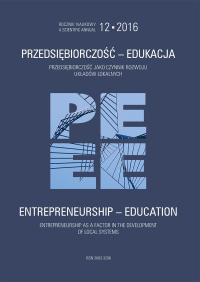Determinanty przedsiębiorczości w opinii nauczycieli i przedsiębiorców. Konkluzje i praktyczne wskazania z programu Perspective
DOI:
https://doi.org/10.24917/20833296.12.28Słowa kluczowe:
kompetencje, nauczyciel, program, przedsiębiorczość, szkolenie, szkołaAbstrakt
Program Perspective (Leonardo da Vinci), realizowany w latach 2013−2015 przez ośmiu partnerów europejskich, poświęcony był udoskonalaniu metod kształcenia nauczycieli pod kątem przedsiębiorczości. W artykule zaprezentowano efekty finalnego etapu projektu, jakim było przeprowadzenie czterech grup fokusowych, w których wzięli udział nauczyciele, przedsiębiorcy, przedstawiciele władz samorządowych, trenerzy oraz dyrektorzy szkół. W grupach tych poszukiwano czynników, które mogą sprzyjać rozwojowi postaw przedsiębiorczych zarówno uczniów, jak i nauczycieli. Próbowano również diagnozować przeszkody i trudności, które należy pokonać, aby tworzyć środowisko edukacyjne bardziej przyjazne budowaniu postaw przedsiębiorczych. Kolejnym celem tych spotkań było określenie warunków sprzyjających szkoleniu facylitatorów przedsiębiorczości. Z badań tych wyłania się obraz szeregu postulatów dla zmian w systemie edukacji, w szczególności dotyczących doboru i szkolenia kadry nauczycielskiej. W artykule przedstawiono listę rekomendacji zgłaszanych przez nauczycieli i przedsiębiorców, jak również komentarz autoraBibliografia
Blanchard, K. (2007). Przywództwo wyższego stopnia. Blanchard o przywództwie i tworzeniu efektywnych organizacji. Warszawa: Wydawnictwo Naukowe PWN.
Blank, G. (2015, 20 marca). Conducting a focus group. Pozyskano z: www.cse.lehigh.edu/~glennb/mm/ FocusGroups.htm
Eliot & Associates (2015, 17 lipca). Guidelines for conducting a focus group. Pozyskano z: https://assessment.trinity.duke.edu/documents/How_to_Conduct_a_Focus_Group.pdf
Gregorczyk, S., Romanowska, M., Sopińska, A., Wachowiak, P. (2007). Program nauczania podstaw przedsiębiorczości dla liceum ogólnokształcącego, liceum profilowanego i technikum. Przedsiębiorczość bez tajemnic. Warszawa: Wydawnictwo WSiP.
Morgan, D.L. (1998). The focus group guidebook. Thousand Oaks, London, New Delhi: Sage Publications.
Strona programu Perspective (2015, 4 października). Pozyskano z: http://www.perspectiveproject.eu/pl
Szeliga, P. (2007). Chwasty na polu przedsiębiorczości, czyli czego w szkole nie uprawiać. W: P. Wachowiak, M. Dąbrowski, B. Majewski (red.), Kształtowanie postaw przedsiębiorczych a edukacja ekonomiczna. Warszawa: Fundacja Promocji i Akredytacji Kierunków Ekonomicznych.
Wypych, M. (2012). Warunki skuteczności osób proaktywnych w organizacjach. W: M. Motyka, J. Pawlak (red.), Podmiotowość człowieka w organizacji. Kraków: Wydawnictwo Uniwersytetu Ekonomicznego.
Pobrania
Opublikowane
Jak cytować
Numer
Dział
Licencja
Artykuły publikowane są zgodnie z warunkami licencji Creative Commons (CC BY-ND 4.0; uznanie autorstwa-bez utworów zależnych).

